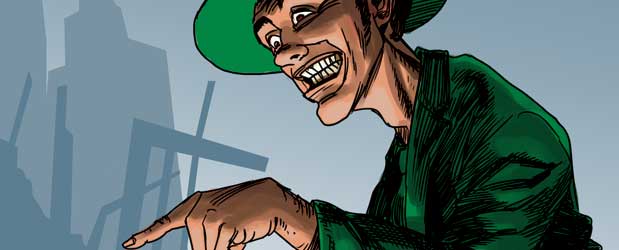 On the Cult of ORE mailing list, ‘The Unshaven’ said his group’s first game of Better Angels fell a little flat because characters kept failing at their rolls. Starting characters’ dice pools are often small, so they’re not likely to succeed at a lot of rolls on their own merits. Caleb Stokes replied with this great advice.
On the Cult of ORE mailing list, ‘The Unshaven’ said his group’s first game of Better Angels fell a little flat because characters kept failing at their rolls. Starting characters’ dice pools are often small, so they’re not likely to succeed at a lot of rolls on their own merits. Caleb Stokes replied with this great advice.
Seizing Advantage
In a first game of Better Angels, you’ve got to really encourage use of advantages like Surprises, Secrets, and Weapons. And the GM has to be generous handing out those bonuses. When that Alchemy roll fails, the Natural Philosopher should have a wrench behind his back. The player characters should be riffling through the trash of any villains they want to fight the night before the battle. In short, characters that want to be effective in early stages of the game need to be sneaky, sniveling little assholes. This usually leads to more sin, so they get more powerful more quickly.
But Better Angels isn’t really a game about success. It’s a game about failure, getting tired of failure, cheating to taste success, and in turn setting yourself up for greater failures (the ultimate of which is Hell). A Venture Bros.-esque tone worked best for my players. They didn’t crit every roll, but when they failed they had a narrative framework with which to build a reaction to that failure.
Demonic Perfection
Failure is also just another motivation to offer up those Master Dice. Demon players should use repeated whiffs to lure their humans into a sweetly assured success. Sure, the demon gets hurt in the short term, but it doesn’t have to turn on the perfection unless the human promises to do something truly awful in return. If the human ditches out, that’s just all the more reason for a demon to turn the powers off at an inopportune time or deny Aspect invocation. A promised atrocity traded for a Master Die can lead to entire subplots over extended play.
Devilish Devices
Another thing you can do is start players off with Devilish Devices. There aren’t specific rules for letting new characters start with them, but one Devilish Device can make even a freshly statted-up character feel like a boss. From what you’ve described, it sounds like your players were supervillains already at the time the game began. It would make perfect sense that they’d already built some toys.
Changing Chargen
Finally, a house rule I made is that while I still split character generation between two people, I don’t do it as written for brand new players who hadn’t read the whole book. A lot of the powers have wonky descriptions that don’t line up entirely with what their title implies. Splitting powers and aspects between two people that don’t know the system can lead to ineffective power/aspect sets like Arrogance/Ineffable Defense. (Congrats! You’re obstinate and unimpressed!). And it can mean picking powers and aspects for which the character doesn’t have enough dice in his or her stats. For players entirely new to the game, I let the demon pick all the powers and aspects, then I let the human decide on the dice pools — which defines how well the powers and aspects work and how close to Hell the character is at the beginning. That allows for some traditional power-gaming without totally unbalancing the game, and it gets people interested enough in the setting and the play dynamic that they’ll come back for traditional character generation and long-term play.
—Caleb Stokes
